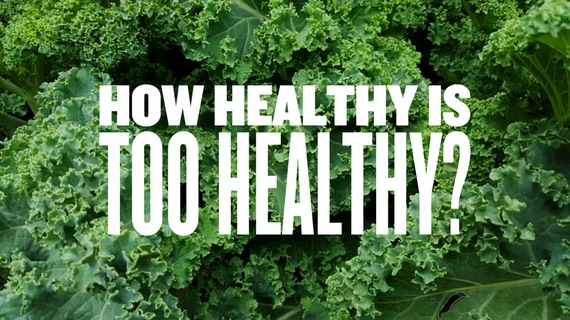In case you hadn't noticed, the world has gone kale mad. There's a rumor that cauliflower will be the new kid on the superblock, but I am not sure how well that will work at the juice bar. Steam it, mash it, roast it, yes! But drink it? Er, no thank you. Kale on the other hand, is a juicing staple. Try it with cucumber and apple for something simple and delicious. It can also be amazing in salads, although some people beg to differ. My intern's mom says she feels like raw kale is trying to bite her. I totally agree, it can be an aggressive mouthful! The solution is to either switch to baby kale or use a great marinade such as my honey, lemon and tahini recipe. Massage it (yes, really) into the leaves and they soften magically.
Of course, you're also allowed to skip kale all together. Your limbs won't fall off, your liver will still detox all by itself and the world will keep on spinning. Just make sure you are eating some cruciferous vegetables, okay? Cabbage, cauliflower, broccoli and Brussels all count too.
In actual fact, I've had a few clients recently who -- for one reason or another -- I asked to cut back on the kale. I'm seeing more and more food diaries that offer up a long list of superfoods but not enough variety or calories. At a professional development event for nutritional therapists that I attended earlier this year, we found that many of us have had clients come in following incredibly restrictive diets after going Internet-crazy. The World Wide Web is an amazing thing, but it's so easy to read too much and self-diagnose. With pesticides, growth hormone, antibiotics, petroleum-based dyes, hyper-processed fats and ridiculous amounts of sugar in our food, it's easy to get paranoid. The upshot though is that we can also become too restrictive. Here's what to look out for:
How healthy is too healthy?
When it isn't healthy for YOU
Following healthy blogs can be inspiring, but as promising as they sound, what works for one person may not necessarily be the right approach for you. In addition, what's effective in the short term may also not be a sensible long term strategy. For example, there's a fantastic juicing documentary called "Fat, Sick & Nearly Dead." Joe Cross, an Australian junk food addict, travels across the U.S. with a juicer in the back of his car, living off juice for 60 days. He loses weight and feels amazing. Of course he does, because the diet he was eating before was awful! However, if you are already in reasonable health and eating well, following a juice-only diet isn't necessarily a good fit, especially in regards to blood sugar balance.
When you don't rotate your greens
Although I don't follow a juice-only plan, I am a huge fan of green juices. However, it's worth noting that some raw greens are high in oxalic acid, which in excess can lead to the formation of kidney stones (especially in some people with genetic susceptibility). This doesn't mean you have to write off green juices and smoothies, but rather rotate high oxalic greens (e.g., spinach, swiss chard and beet tops) with low oxalic greens (lettuce, celery, cucumber, watercress and collards). For those with a diagnosed thyroid problem, rotation also helps to prevent over-exposure to goitrogens, which may impact thyroid function, especially when coupled with a known deficiency of iodine. Upshot? Whether it's juice or whole vegetables, mix it up and don't do the same thing every day.
When it's too restrictive
The combination of an ethical food philosophy and food sensitivity can be a dietary bummer. Imagine you prefer to avoid factory farmed meat and animal products and that you also have multiple food sensitivities. Going out to dinner or even working out what to eat for breakfast can be a nightmare. If you find yourself standing in front of a full fridge and wondering what on earth you can eat, then we have a problem. It's especially dangerous if you end up not eating at all because you can't find an acceptable option. This situation is starting to be defined as "orthorexia" -- essentially an unhealthy obsession with healthy eating. Psychological support is essential as well as a qualified nutritionist or dietitian who can help you improve your options and soften the boundaries.
When you can't feel the love
Food should be nourishing but it should also be a joy. Making and sharing food is an ancient and basic human pastime. If your healthy eating is socially crippling or making you feel deprived then it won't last long. The trick is to search out clean-eating recipes that allow you to enjoy your favourites in a healthier way. The 100 Days of Real Food blog and the Clean Eating magazine website are great resources.
When your dietary choice pens you in
Are you a vegan or a vegetarian? A paleo lover or a clean-eating die-hard? There's nothing wrong with having a definition -- and inf act having a "food philosophy" can be helpful -- but it also shouldn't define you. You are what you eat but you are also much more than that! It's a bit depressing to feel as if you have failed or broken a rule by deviating from your norm. Sticking to something so very strictly might make you miss a physical cue. If you are craving meat for example, perhaps there's a reason why. If you have high cholesterol on the paleo plan, it's a shame to cut out oats and beans. Different things work for different people at different times in their lives. Listen to your body and don't let your dietary choice restrict you in a negative way.
Want more? Please join me on Facebook for lots of healthy ideas, recipes and tips. See you there!
If you're struggling with an eating disorder, call the National Eating Disorder Association hotline at 1-800-931-2237.
